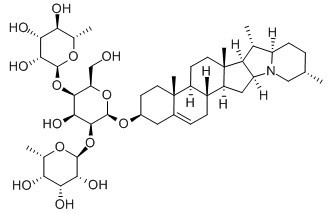alpha-Chaconine
Alpha-Chaconine has anti-inflammatory effect, associated with the suppression of AP-1, and supports its possible therapeutic role for the treatment of sepsis. Alpha-Chaconine also has cytotoxic effects.
Inquire / Order:
manager@chemfaces.com
Technical Inquiries:
service@chemfaces.com
Tel:
+86-27-84237783
Fax:
+86-27-84254680
Address:
1 Building, No. 83, CheCheng Rd., Wuhan Economic and Technological Development Zone, Wuhan, Hubei 430056, PRC
Providing storage is as stated on the product vial and the vial is kept tightly sealed, the product can be stored for up to
24 months(2-8C).
Wherever possible, you should prepare and use solutions on the same day. However, if you need to make up stock solutions in advance, we recommend that you store the solution as aliquots in tightly sealed vials at -20C. Generally, these will be useable for up to two weeks. Before use, and prior to opening the vial we recommend that you allow your product to equilibrate to room temperature for at least 1 hour.
Need more advice on solubility, usage and handling? Please email to: service@chemfaces.com
The packaging of the product may have turned upside down during transportation, resulting in the natural compounds adhering to the neck or cap of the vial. take the vial out of its packaging and gently shake to let the compounds fall to the bottom of the vial. for liquid products, centrifuge at 200-500 RPM to gather the liquid at the bottom of the vial. try to avoid loss or contamination during handling.
Molecules.2021, 26(3):695.
J Nat Med.2020, 74(1):65-75
Front Pharmacol.2020, 11:251.
Crystals2020, 10(3), 206.
Korean Journal of Pharmacognosy.2019, 50(1):65-71
The Korea Journal of Herbology2016, 29-35
Plants (Basel).2022, 11(16):2126.
Molecules.2022, 27(5):1675
Agriculture.2024, 69(3):140-148.
Analytical Letters.2020, doi 10.1008
Related and Featured Products
Food Chem. 2013 Nov 15;141(2):669-74.
Synergistic cytotoxicity induced by α-solanine and α-chaconine.[Pubmed:
23790833]
α-Solanine and alpha-Chaconine are well-known potato toxins, but the mechanism of the synergistic cytotoxic effect of these alkaloids has been little clarified.
METHODS AND RESULTS:
This study confirmed their synergistic cytotoxic effects on C6 rat glioma cells by three different cell viability tests, namely WST-1 (water-soluble tetrazolium) assay sensitive to intracellular NADH concentration, menadione-catalysed chemiluminescent assay depending on both NAD(P)H concentration and NAD(P)H:quinone reductase activity, and LDH (lactate dehydrogenase) assay sensitive to the release of LDH from damaged cells. The maximum cytotoxic effect was observed at a ratio of 1:1 between α-solanine and alpha-Chaconine at micromolar concentrations.
CONCLUSIONS:
The cytotoxic effects of these alkaloids were observed immediately after incubation and were constant after 30min, suggesting that rapid damage of plasma membrane causes the lethal disorder of metabolism.
Chem Biol Interact . 2015 Jun 25;235:85-94.
α-Chaconine isolated from a Solanum tuberosum L. cv Jayoung suppresses lipopolysaccharide-induced pro-inflammatory mediators via AP-1 inactivation in RAW 264.7 macrophages and protects mice from endotoxin shock[Pubmed:
25913072]
Abstract
In this study, we investigated the molecular mechanisms underlying the anti-inflammatory effects of α-chaconine in lipopolysaccharide (LPS)-induced RAW 264.7 macrophages and in LPS-induced septic mice. α-Chaconine inhibited the expressions of cyclooxygenase-2 (COX-2), interleukin-1β (IL-1β), IL-6, and tumor necrosis factor-α (TNF-α) at the transcriptional level, and attenuated the transcriptional activity of activator protein-1 (AP-1) by reducing the translocation and phosphorylation of c-Jun. α-Chaconine also suppressed the phosphorylation of TGF-β-activated kinase-1 (TAK1), which lies upstream of mitogen-activated protein kinase kinase 7 (MKK7)/Jun N-terminal kinase (JNK) signaling. JNK knockdown using siRNA prevented the α-chaconine-mediated inhibition of pro-inflammatory mediators. In a sepsis model, pretreatment with α-chaconine reduced the LPS-induced lethality and the mRNA and production levels of pro-inflammatory mediators by inhibiting c-Jun activation. These results suggest that the anti-inflammatory effects of α-chaconine are associated with the suppression of AP-1, and support its possible therapeutic role for the treatment of sepsis.
Keywords: AP-1; Inflammatory mediators; MKK7; Sepsis; α-Chaconine.
Chem Biol Interact. 2015 Jun 25;235:85-94.
α-Chaconine isolated from a Solanum tuberosum L. cv Jayoung suppresses lipopolysaccharide-induced pro-inflammatory mediators via AP-1 inactivation in RAW 264.7 macrophages and protects mice from endotoxin shock.[Pubmed:
25913072]
In this study, we investigated the molecular mechanisms underlying the anti-inflammatory effects of alpha-Chaconine in lipopolysaccharide (LPS)-induced RAW 264.7 macrophages and in LPS-induced septic mice.
METHODS AND RESULTS:
alpha-Chaconine inhibited the expressions of cyclooxygenase-2 (COX-2), interleukin-1β (IL-1β), IL-6, and tumor necrosis factor-α (TNF-α) at the transcriptional level, and attenuated the transcriptional activity of activator protein-1 (AP-1) by reducing the translocation and phosphorylation of c-Jun. alpha-Chaconine also suppressed the phosphorylation of TGF-β-activated kinase-1 (TAK1), which lies upstream of mitogen-activated protein kinase kinase 7 (MKK7)/Jun N-terminal kinase (JNK) signaling. JNK knockdown using siRNA prevented the alpha-Chaconine -mediated inhibition of pro-inflammatory mediators. In a sepsis model, pretreatment with alpha-Chaconine reduced the LPS-induced lethality and the mRNA and production levels of pro-inflammatory mediators by inhibiting c-Jun activation.
CONCLUSIONS:
These results suggest that the anti-inflammatory effects of alpha-Chaconine are associated with the suppression of AP-1, and support its possible therapeutic role for the treatment of sepsis.



